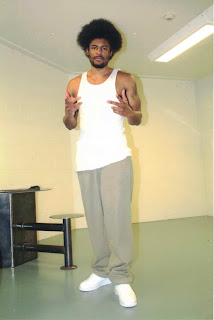By Sabir Shabazz aka Elohim
Yesterday I participated in a much-needed decompression with a psychologist. When I returned to the cell, a question that occurred to me was whether psych staff ever move beyond the superficial consideration of the wellbeing of prisoners who they don’t speak to, ones who are not talking, suffering in their own muted worlds. Outward silence alone is not an indicator of sound mental health. On the contrary, solitary confinement actually alters the integrity of some vital biological processes. Because of the stigma, prisoners avoid psych therapy and the appearance of mental illness. To those of us living in solitary confinement, and perhaps to outside observers (staff members) with proper training or just a keen eye, the signs are obvious. We are NOT okay.
A neuroscience paper by Dana G. Smith titled, “Neuroscientists make a case against solitary confinement,” shares that: “Robert King spent 29 years living alone in a six by nine-foot prison cell… “Even in less extreme cases than that of the Angola Three, prolonged social isolation -feeling lonely, not just being alone- can exact severe physical, emotional and cognitive consequences. It is associated with a 26 percent increased risk of premature death, largely stemming from and on-going, out of control stress response that results in higher cortisol levels, increased blood pressure and inflammation.”
“Feeling socially isolated also increases the risk of suicide. We see solitary confinement as nothing less than a death penalty by social deprivation,” said Stephanie Cacioppo, an assistant professor of psychiatry and behavioral neuroscience at the University of Chicago, who was on the panel with King.
I admit when I initially read this paper, it gave me a scare. Particularly because when I wake up in the morning my cortisol levels are often booming. Prior to reading the research, I’d associated my anxiousness from elevated cortisol levels with being young and having a robust metabolism. I’d concluded I was a morning person, and I seemed to have an excess of energy that time of the day so it was an ideal time to exercise. Plus, exercising flooded my body with endorphins and dopamine, quelling my anxiousness.
Another aspect is the changes inhibiting the brain from marshalling an effective stress response. In other words, solitary confinement disrupts our brain’s ability to direct the proper signals allowing for the corresponding chemical reaction. The uncontrolled stress response is no momentary lapse of memory, but rather the effect of altered brain structure and chemistry.
The sad irony is that solitary confined prisoners perpetuate the stigma surrounding the seeking of mental health counseling. If that is not a clear indicator that we are not okay, I don’t know what is.
I am amused when the prisoners who contend, they have the most sound mental health, who present this “Captain America” visage (a Marvel Superhero) openly express their ideas and beliefs. They often teeter more perilously on the cliff of non compos mentis than anyone else.
Most laughable art the prisoners, who bombard other prisoners with criticism for seeking therapy. These same prisoners attend every incentivized psych-based class which wouldn’t even exist if a class of severely mentally ill prisoners hadn’t somehow managed to file a lawsuit in pursuit of help. I don’t mean laughable in the LMAO or LOL sense either but as an awful lampoon.
The coup de grace however, comes from Correction Officers (COs). I’ve seen and heard them deride and poke fun at prisoners who are seeking help and filing administrative grievances. The instances I’ve observed were not discrete or quiet. The COs were clearly culpable for creating division between prisoners and deterring them from seeking the help they needed. This isn’t behavior confined to a specific prison, but a prevailing attitude of many COs in federal and state penitentiaries.
I used to wonder why one individual would wear his headphones when in the cell and would only speak to others in different cells at the times he chose. You could call out to him all you wanted, but he was going to respond on his terms, i.e., when his headphones were off. Another prisoner said he knew why the guy did that, but he never explained it to me. There are a number of plausible reasons I don’t care to speculate about here, but one thing I know is that prolonged sensory deprivation has made my hearing hypersensitive. The usual noises tend to disturb me: Doors opening and slamming shut, people yelling to each other from inside the cells, sounds people make while exercising.
So I can grasp why some prisoners turn the television volume up to one-hundred before 6am. Perhaps they have not embraced silence or do not desire to be left alone with their thoughts. Perhaps even the silence is not silence, but a piercing abysmal screech and the television noise a soothing ointment keeping them grounded in reality or what appears to be reality.
I can understand why prisoners punch rolled up mattresses for 2-4 hours straight until their pain and blood spills from disfigured and hurting hands, or why prisoners watch 16 hours of television daily, riding the wave of…the wave.
Or when prisoners exercise excessively beyond exhaustion daily, their body awash in endorphins and dopamine; Dope I Mean; Do I Mean…
What I do mean, what I do know is that despite what I know, and what others may assume, I am okay only in the sense I know I am not okay. Okay?

Sabir Shabazz #41119086
* for more information click here


3 Comments
Tony John
June 29, 2024 at 2:55 pmKeep your head up my guy
/Tony John
Iliana adam
November 21, 2020 at 9:40 pmI like your writing
Boney Maroney
August 17, 2020 at 1:55 pmExcellent writing Sabir, (I thought)
Here's hoping your future brightens.